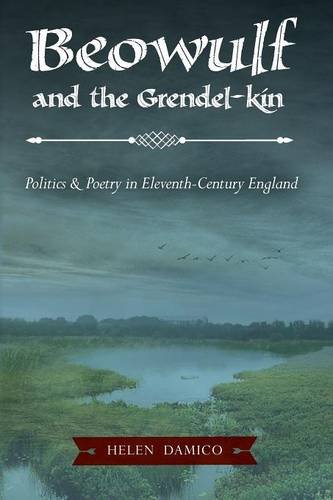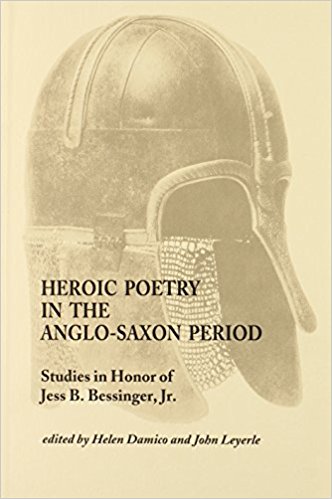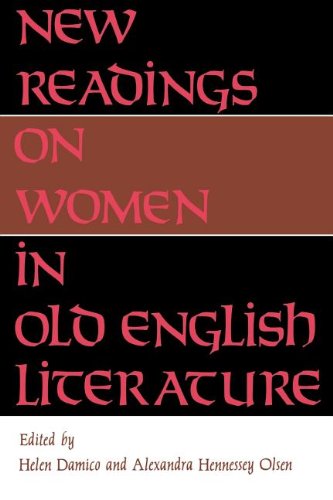Helen Damico
Helen Damico is Professor Emerita of English Medieval Language and Literature at the University of New Mexico, here she was twice selected as Outstanding Teacher and honored as UNM Presidential Teaching Fellow. She is the founder of its Institute of Medieval Studies, a recipient of the New Mexico Humanities Award for Lifetime Contributions to the Humanities, and a member of the Medieval Academy of America and recipient of its CARA Award for Outstanding Service to Medieval Studies. She is also an Honorary Member of the International Society of Anglo-Saxonists.
Beowulf and the Grendel-kin
 | "In Beowulf and the Grendel-kin: Politics and Poetry in Eleventh-Century England, Helen Damico presents the first concentrated discussion of the initiatory two-thirds of Beowulf's 3,182 lines in the context of the turbulent years that composed the first half of the eleventh century in Anglo-Danish England. Damico offers incisive arguments that major historical events and personages pertaining to the reign of Cnut and his sons recorded in the Anglo-Saxon Chronicle, the Encomium Emmae Reginae, and the major continental and Scandinavian historical texts, hold striking parallels with events and personages found in at least eight narrative units, as recorded by Scribe A in BL, Cotton Vitellius A.xv, that make up the poem's quasi sixth-century narrative concerning the fall of the legendary Scyldings. Given the poet's compositional skill--widely relational and eclectic at its core--and his affinity with the practicing skalds, these strings of parallelisms could scarcely have been coincidental. Rather, Damico argues that examined within the context of other eleventh-century texts that either bemoaned, darkly satirized, or obversely celebrated the rise of the Anglo-Danish realm, the Beowulfian units may brig forth a deeper understandng of the complexity of the poet's compositional process. Damico illustrates the poet's use of the tools of his trade--compression, substitution, skillful encoding of character--to reinterpret and transform grave sociopolitical 'facts' of history, to produce what may be characterized as a type of historical allegory whereby two parallel narratives, one literal and another veiled, are simultaneously operative. Beowulf and the Grendel-kin lays out the story of the poem, not as a monster narrative nor a folklorish nor solely a legendary tale, but rather as a poem of its time, a historical allegory coping with and reconfiguring sociopolitical events of the first half of eleventh-century Anglo-Saxon England." Buy this book:Amazon.com | University Bookstore |
Heroic Poetry in the Anglo-Saxon Period: Essays in Honor of Jess B. Bessinger, Jr.
 | "Eighteen essays by some of the most prominent British and North American students of heroic poetry, plus two poems and a bibliography, are gathered here to honor Jess B. Bessinger Jr., whose innovative studies of heroic poetry have instructed a generation of scholars and whose performances of Anglo-Saxon poems are legendary." Buy this book:Amazon.com | University Bookstore |
New Readings on Women in Old English Literature
 | "The publication of this volume of essays is a milestone in Old English studies. It is the first collection to examine this literature from a feminist perspective. Although the contributors represent a plurality of approaches and positions, they share a common objective: to reassess women as women, as they actually appear in the laws, in works written by women, and in canonical literature. The essays address, correct, and round out the nineteenth-century Anglo-Saxon critical tradition and begin fresh exploration of the women in Old English literature. The subjects discussed fall into the following broad categories: the historical record; sexuality and folklore; language and difference in characterization and the "deconstructed" stereotype. Contributors include Marijane Osborn; Christine E. Fell; F.T. Wainwright; Pauline Stafford; Frank M. Stenton; Mary P. Richard s and B. Jane Stanfield; Carol J. Clover; Edith Whitehurst Williams; Paul E. Szarmach; Audrey L. Meaney; Helen Damico; Patricia A. Belanoff; L. John Sklute; Paul Beekman Taylor; Alexandra Hennessey Olsen; Joyce Hill; Jane Chance; Alain Renoir; Dolores Warwick Frese; and Anita R. Riedinger." Buy this book:Amazon.com | University Bookstore |






